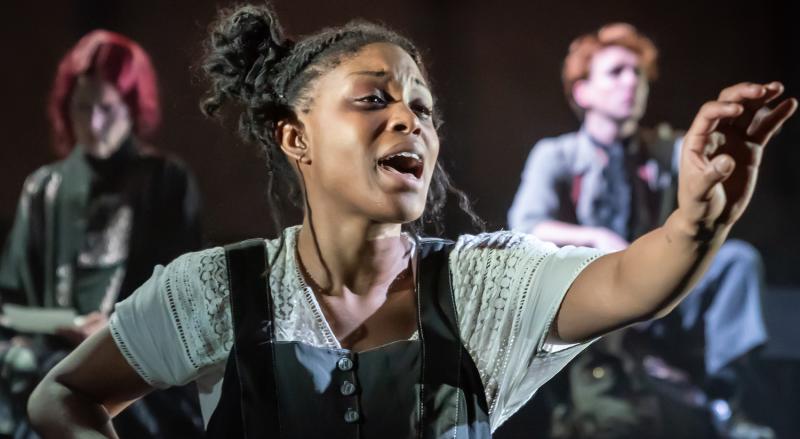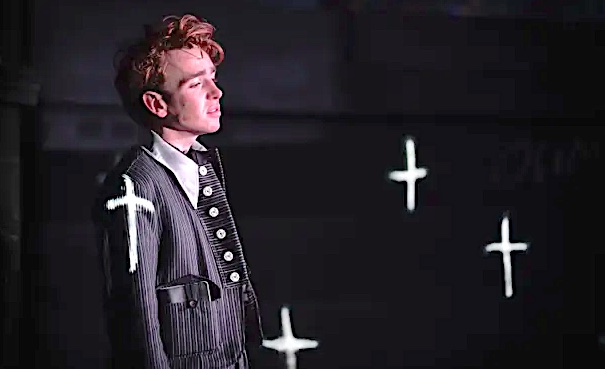Spring Awakening, Almeida Theatre review - must-see revival for Tony-winning musical | reviews, news & interviews
Spring Awakening, Almeida Theatre review - must-see revival for Tony-winning musical
Spring Awakening, Almeida Theatre review - must-see revival for Tony-winning musical
A triumphant musical about teenage angst

When Berliners sat down to watch Franz Wedekind’s debut play Fruhlings Erwachen – Spring Awakening – in 1906, they had little inkling of the kind of drama he had written, or how it would change theatre for the century to come, despite being banned for long periods.
Inevitably, the musical based on the play that became a Broadway hit in 2006 dialled down some of this risqué content, but not by a lot. When I saw it there, my seat neighbours, a kindly middle-aged couple and their daughter, whom they were treating to a night out at that season’s big Tony winner, had no more clue what they had come to see than the Berlin playgoers a century earlier. Skirting potential spoilers, I warned them there was X-rated content to come, though still feared a walkout. But they stayed, intrigued and impressed and, ultimately, moved.
Which is the experience the Almeida’s equally awards-worthy revival of the musical, directed by Rupert Goold, is offering. It has great material to work with: an impeccable score full of great songs from Duncan Sheik, who has subtly retooled it for an eight-piece band with no loss of dramatic impact; and striking lyrics by Steven Sater that move from the elevated and poetic to the blunt and demotic in a heartbeat. This is a superior coming of age piece that never loses sight of Wedekind’s subtitle, A Children’s Tragedy, yet is vastly entertaining and even laugh-out-loud funny at times.
 The setting is Germany in the last decade of the 19th century, where girls and boys are educated separately, and sternly: the girls in the primacy of Kinder, Kuche, Kirche (children, kitchen, church), the boys in how to become pillars of the middle classes. Learning is by rote, grown-ups are remote. Few of the teenagers have had any useful sex education to speak of, which leaves sensitive Moritz (an excellent Stuart Thompson) deeply troubled when his dreams turn ungovernably erotic. Unable to ask his buttoned-down family for help, he turns to his clever-clogs classmate Melchior (Laurie Kynaston, pictured above), son of a more liberal mother. Melchior creates a 10-page sex manual for him, fully illustrated; when it is found by a grown-up, the play’s tragic plot is set in motion. Melchior, meanwhile, is getting much less theoretical experience of sex with his childhood friend Wendla (impressive Amara Okereke), whose sexual naivety is breathtaking.
The setting is Germany in the last decade of the 19th century, where girls and boys are educated separately, and sternly: the girls in the primacy of Kinder, Kuche, Kirche (children, kitchen, church), the boys in how to become pillars of the middle classes. Learning is by rote, grown-ups are remote. Few of the teenagers have had any useful sex education to speak of, which leaves sensitive Moritz (an excellent Stuart Thompson) deeply troubled when his dreams turn ungovernably erotic. Unable to ask his buttoned-down family for help, he turns to his clever-clogs classmate Melchior (Laurie Kynaston, pictured above), son of a more liberal mother. Melchior creates a 10-page sex manual for him, fully illustrated; when it is found by a grown-up, the play’s tragic plot is set in motion. Melchior, meanwhile, is getting much less theoretical experience of sex with his childhood friend Wendla (impressive Amara Okereke), whose sexual naivety is breathtaking.
Miriam Buether’s clever design sets all the action on floor-to-ceiling black steps, but how versatile these steps are. Performers suddenly pop out of them, slide seductively down them head first, dance along them in a writhing group (in punchy choreography by Lynne Page). The stairs are projected upon with crosses, chalked on with slogans (“Gott is tot” “@Gretchen”) and symbols (the COVID virus, the inevitable penis/testicles beloved of graffiti-ists the world over). At points when the plot turns climactic, a large glass box descends for the actors to perform in, as if a showcase for their heightened emotions.
Playing all the adults (parents, teachers), in a range of wigs and masks seemingly modelled on Otto Dix portraits, are Catherine Cusack and Mark Lockyer, but the main players are the squad of teenagers whose awakening – to all the growing pains of adulthood, the confusions over sex and sexuality, their sense of injustice, the repression of their society et al – we follow. This is a gifted ensemble: not just Kynaston and Okereke, with their strong, clear voices and finely tuned acting, but each of the other 11 members of the teenage faction. Particularly eye-catching is Nathan Armarkwei-Laryes, as the closet-gay Hanschen; and in the vocal stakes, Carly-Sophia Davies impresses as a full-throated Ilse, who has left school, embraced decadence as an artist’s model and is certain she is heading for the trash heap. When the group sways as a phalanx or sings a cappella, you feel the thrill of musical theatre at its best.
It’s easy to dismiss the characters’ teen angst as from another, less enlightened era – but worrying yourself sick about your exam results, or your sexuality, is a perennial. And then you think of the young people who have recently been protesting against the failure of older generations to halt climate change, the teens who have argued for their rights against Islamist terrorists, the US high schoolers who marched for gun control, and you realise some things rarely change. Melchior may come across as a smart-arse, but his stance is not just teenage rebellion, any more than Greta Thunberg’s is; and Moritz is the kind of teenage boy who is still breaking parents’ hearts. This is a production that really deserves to be seen, so let’s pray it can stay open during the latest wave of infections.
The future of Arts Journalism
You can stop theartsdesk.com closing!
We urgently need financing to survive. Our fundraising drive has thus far raised £49,000 but we need to reach £100,000 or we will be forced to close. Please contribute here: https://gofund.me/c3f6033d
And if you can forward this information to anyone who might assist, we’d be grateful.

Subscribe to theartsdesk.com
Thank you for continuing to read our work on theartsdesk.com. For unlimited access to every article in its entirety, including our archive of more than 15,000 pieces, we're asking for £5 per month or £40 per year. We feel it's a very good deal, and hope you do too.
To take a subscription now simply click here.
And if you're looking for that extra gift for a friend or family member, why not treat them to a theartsdesk.com gift subscription?
more Theatre
 Othello, Theatre Royal, Haymarket review - a surprising mix of stateliness and ironic humour
David Harewood and Toby Jones at odds
Othello, Theatre Royal, Haymarket review - a surprising mix of stateliness and ironic humour
David Harewood and Toby Jones at odds
 Macbeth, RSC, Stratford review - Glaswegian gangs and ghoulies prove gripping
Sam Heughan's Macbeth cannot quite find a home in a mobster pub
Macbeth, RSC, Stratford review - Glaswegian gangs and ghoulies prove gripping
Sam Heughan's Macbeth cannot quite find a home in a mobster pub
 The Line of Beauty, Almeida Theatre review - the 80s revisited in theatrically ravishing form
Alan Hollinghurst novel is cunningly filleted, very finely acted
The Line of Beauty, Almeida Theatre review - the 80s revisited in theatrically ravishing form
Alan Hollinghurst novel is cunningly filleted, very finely acted
 Wendy & Peter Pan, Barbican Theatre review - mixed bag of panto and comic play, turned up to 11
The RSC adaptation is aimed at children, though all will thrill to its spectacle
Wendy & Peter Pan, Barbican Theatre review - mixed bag of panto and comic play, turned up to 11
The RSC adaptation is aimed at children, though all will thrill to its spectacle
 Hedda, Orange Tree Theatre review - a monument reimagined, perhaps even improved
Scandinavian masterpiece transplanted into a London reeling from the ravages of war
Hedda, Orange Tree Theatre review - a monument reimagined, perhaps even improved
Scandinavian masterpiece transplanted into a London reeling from the ravages of war
 The Assembled Parties, Hampstead review - a rarity, a well-made play delivered straight
Witty but poignant tribute to the strength of family ties as all around disintegrates
The Assembled Parties, Hampstead review - a rarity, a well-made play delivered straight
Witty but poignant tribute to the strength of family ties as all around disintegrates
 Mary Page Marlowe, Old Vic review - a starry portrait of a splintered life
Tracy Letts's Off Broadway play makes a shimmeringly powerful London debut
Mary Page Marlowe, Old Vic review - a starry portrait of a splintered life
Tracy Letts's Off Broadway play makes a shimmeringly powerful London debut
 Little Brother, Soho Theatre review - light, bright but emotionally true
This Verity Bargate Award-winning dramedy is entertaining as well as thought provoking
Little Brother, Soho Theatre review - light, bright but emotionally true
This Verity Bargate Award-winning dramedy is entertaining as well as thought provoking
 The Unbelievers, Royal Court Theatre - grimly compelling, powerfully performed
Nick Payne's new play is amongst his best
The Unbelievers, Royal Court Theatre - grimly compelling, powerfully performed
Nick Payne's new play is amongst his best
 The Maids, Donmar Warehouse review - vibrant cast lost in a spectacular-looking fever dream
Kip Williams revises Genet, with little gained in the update except eye-popping visuals
The Maids, Donmar Warehouse review - vibrant cast lost in a spectacular-looking fever dream
Kip Williams revises Genet, with little gained in the update except eye-popping visuals
 Ragdoll, Jermyn Street Theatre review - compelling and emotionally truthful
Katherine Moar returns with a Patty Hearst-inspired follow up to her debut hit 'Farm Hall'
Ragdoll, Jermyn Street Theatre review - compelling and emotionally truthful
Katherine Moar returns with a Patty Hearst-inspired follow up to her debut hit 'Farm Hall'
 Troilus and Cressida, Globe Theatre review - a 'problem play' with added problems
Raucous and carnivalesque, but also ugly and incomprehensible
Troilus and Cressida, Globe Theatre review - a 'problem play' with added problems
Raucous and carnivalesque, but also ugly and incomprehensible

Add comment